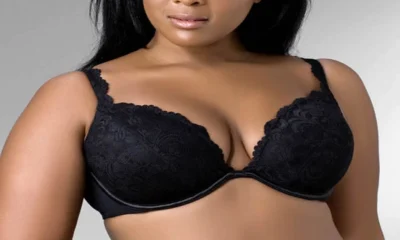HEALTHY LIVING
How to Maintain A Healthy Hair
Published
2 years agoon
By
Juliet Udoh
Are you having issues taking good care of your hair? Do you have hair breakage and can’t seem to maintain a healthy hair? No need to worry because Fab.ng has you covered. Maintaining healthy hair is important for people of all ethnic backgrounds, including Nigerians and Africans.

Tips to help keep your Hair Healthy
1. Moisturize Regularly: African hair tends to be naturally dry. Moisturizing your hair regularly is essential for preventing breakage and keeping it healthy. Use a water-based moisturizer or leave-in conditioner to hydrate your hair and seal in the moisture with natural oils, like coconut oil or shea butter.
2. Protect Your Hair at Night: Sleep with a satin or silk bonnet or use a satin or silk pillowcase. Unlike cotton, which can cause friction and breakage, satin or silk materials help to minimize damage and retain moisture.

3. Deep Condition: Incorporate deep conditioning treatments into your hair care routine. Deep conditioning helps to nourish and strengthen your hair, improving its overall health. Look for products with ingredients like aloe vera, glycerine, or honey, which provide moisture to the hair shaft. Conditioning helps to replenish the moisture in your hair and make it more manageable. Condition your hair after every wash, or even more often if needed.
4. Avoid Over styling: Limit the use of heat styling tools like flat irons and curling irons, as excessive heat can cause damage and breakage. When using heat, apply a heat protectant spray to minimize damage. Opt for protective hairstyles that allow your hair to rest and minimize manipulation.
5. Be Gentle with Detangling: Use a wide-toothed comb or your fingers to gently detangle your hair, starting from the ends and working your way up to the roots. Detangle when your hair is wet and saturated with conditioner, as it will be more manageable and less prone to breakage.

6. Wash Your Hair Regularly: Find a shampoo and conditioner that work for your hair type and wash your hair regularly to remove dirt, product buildup, and excess oils. The more often you wash your hair, the more natural oils are removed. Aim to wash your hair 2-3 times per week, or less if possible. Be sure to use a sulphate-free shampoo, as sulphates can be drying to the hair.
7. Protect Your Hair from the Sun: The sun’s rays can be damaging to your hair, causing dryness and breakage. You can protect your hair by wearing a hat or using products with UV protection.
8. Eat a Balanced Diet: Good nutrition plays a crucial role in hair health. Make sure to consume a diet rich in protein, vitamins, and minerals. Foods like fish, eggs, nuts, fruits, vegetables, and whole grains can contribute to healthy hair. Eating a healthy diet can help to improve the overall health of your hair, skin, and nails. Make sure to include plenty of fruits, vegetables, and whole grains in your diet.
9. Avoid Harsh Chemicals: Limit the use of chemical treatments like relaxers and excessive colouring as these can weaken the hair and cause damage and breakage. Avoid using products that contain harsh chemicals, such as sulphates, parabens, and phthalates. These chemicals can strip your hair of its natural oils and proteins, making it dry, brittle, and prone to breakage. Instead, opt for natural hair products that are made with ingredients like shea butter, coconut oil, and aloe vera.

10. Get Regular Trims: Regular trims are essential for maintaining healthy hair. Trimming off split ends prevents further damage and breakage, promoting healthier hair growth. Remember, everyone’s hair is unique, so it’s important to listen to your hair and adapt these tips to suit your specific hair needs. Developing a consistent hair care routine and being gentle with your hair will go a long way in maintaining its health and vibrancy. Trimming your hair regularly will help to remove split ends and damaged hair, which can make your hair look healthier and fuller. Aim to get a trim every 6-8 weeks.
11. Use heat protectant when styling your hair: Heat styling can damage your hair, so it’s important to use a heat protectant before you use any heat tools. Heat protectants help to create a barrier between your hair and the heat, preventing it from being damaged.
12. Manage stress: Stress can take a toll on your hair health. Find healthy ways to manage stress, such as exercise, yoga, or meditation.
Additional tips that are specific to Nigerian and African Hair Texture
- Use a pre-poo treatment: A pre-poo treatment is a conditioning treatment that you apply to your hair before you wash it. Pre-poo treatments can help to protect your hair from the harsh chemicals in shampoo and make it easier to detangle.
- Deep condition your hair regularly: Deep conditioning treatments help to restore moisture and nutrients to your hair. Deep condition your hair once a week, or more often if needed.

- Use a leave-in conditioner: A leave-in conditioner helps to keep your hair moisturized and protected between washes. Apply a leave-in conditioner to your hair after you wash it and style it as usual.
- Protect your hair from the sun and heat: The sun and heat can damage your hair, so it’s important to protect it when you’re outdoors. Wear a hat or scarf to protect your hair from the sun and use a heat protectant when you style your hair with heat tools.
- Be patient: It takes time and effort to keep your hair healthy. Don’t get discouraged if you don’t see results immediately. Just keep following these tips, and you’ll eventually see a difference.

- Use a traditional African hair treatment: There are many traditional African hair treatments that can help to keep your hair healthy. Some popular treatments include shea butter, coconut oil, and black soap.
- Get a protective hairstyle: If you live in a hot climate or if you are frequently exposed to the sun, it is important to protect your hair with a protective hairstyle. Some popular protective hairstyles include braids, twists, and cornrows.
You may like
-


Do Bras Really Keep Breasts From Sagging? Check This Out!
-


Statements You Make With Freeform Dreadlocks & Myths Around It
-


5 Things You Should Always Keep Private
-


Why Do Women Live Longer Than Men? See Reasons Behind The Longevity Gap
-


How To Beat The Monday Blues: Simple Strategies For A Smoother Start
-


How To Strengthen Falling Hair With Castor Oil
HEALTHY LIVING
5 Ways To Stay Healthy This Christmas Season
Published
3 months agoon
December 21, 2024By
wpadminee
The Christmas season is full of joy, food, and celebrations, but it can also be a time when health routines fall by the wayside. To stay healthy during the festive period, adopting mindful habits is key.
Here are five actionable strategies to ensure you enjoy the festivities while prioritising your well-being.
1. Make Balanced Food Choices
The holiday season is synonymous with indulgence. While it’s tempting to try everything on the table, opt for a balanced approach. Start meals with proteins and vegetables, which keep you full longer and stabilise your blood sugar.
Enjoy festive treats in moderation, allowing yourself small portions of your favourites without overindulging. By practising mindful eating, you can savour holiday flavours without guilt.
Staying hydrated is equally important. Drink plenty of water to counterbalance rich foods and avoid excessive sugary beverages or cocktails. Alternating alcohol with water is a good way to maintain balance during parties.
2. Prioritise Regular Exercise
Exercise doesn’t have to stop during the Christmas season. Incorporate simple physical activities like morning walks, quick home workouts, or even yoga to maintain your energy levels and reduce stress.
A 10–15 minute walk after meals can aid digestion and manage blood sugar levels. Staying active ensures you feel energised and offsets the effects of holiday indulgences.
3. Manage Holiday Stress
The Christmas season can be hectic, with endless to-do lists and social events. Combat stress by practising mindfulness and setting realistic expectations for your time.
Take breaks when needed, meditate, or engage in activities that help you unwind. Organising your tasks and delegating responsibilities can also alleviate pressure.
4. Get Adequate Sleep
Sleep is crucial for overall health, especially during a busy festive period. Poor sleep can lead to increased cravings and mood swings, making it harder to stick to healthy habits. Aim for 7–8 hours of rest each night.
Create a calming bedtime routine by avoiding screens, dimming lights, and reading a book to relax. Staying consistent with your sleep schedule will keep your energy levels high throughout the Christmas season.
5. Plan Ahead for Healthier Choices
With back-to-back events, it’s easy to fall into unhealthy eating habits. Preparing healthy snacks like nuts, boiled eggs, or fruit ensures you have nutritious options on hand.
Planning meals and snacks ahead of time helps avoid impulsive decisions, keeping your health goals on track even during the busiest days.
Enjoy the Festivities While Staying Healthy
By focusing on mindful eating, staying active, managing stress, sleeping well, and planning ahead, you can enjoy the Christmas season while maintaining your health. Balancing fun with wellness ensures you start the new year feeling your best.
If you found this article helpful, read more here.
FOOD
5 Health Benefits Of Cooking With Garlic
Published
4 months agoon
December 7, 2024By
wpadminee
Garlic is more than just a flavour enhancer; it offers numerous health benefits that have been celebrated for centuries. Incorporating garlic into your meals not only enriches the taste but also boosts your overall well-being.
Let’s explore five key health benefits of garlic, emphasising why this simple ingredient deserves a spot in your kitchen.
1. Boosts Heart Health
Garlic is renowned for its heart-protective properties. It helps lower blood pressure and reduces cholesterol levels, which are crucial factors in maintaining cardiovascular health.
Allicin, a compound found in garlic, relaxes blood vessels, improving blood flow and reducing the risk of heart disease.
Regular consumption of garlic may also prevent artery hardening, a condition known as atherosclerosis. Clearly, one of the primary health benefits of garlic is its contribution to a healthy heart.
2. Strengthens the Immune System
Garlic acts as a powerful immune booster. Its antibacterial, antiviral, and antifungal properties help the body fend off infections. Rich in antioxidants, garlic combats free radicals that can damage cells and contribute to illness.
Cooking with garlic regularly can support your immune system, making it more resilient against common colds and flu. This vital health benefit of garlic makes it a natural defence mechanism.
3. Improves Digestive Health
Garlic promotes healthy digestion by stimulating the production of digestive enzymes. Its antimicrobial properties can help balance gut flora, reducing harmful bacteria and promoting beneficial ones.
Additionally, garlic may reduce inflammation in the gut, alleviating symptoms of conditions like irritable bowel syndrome (IBS).
Including garlic in your diet can improve overall digestive function, emphasising another essential health benefit of garlic.
4. Enhances Bone Health
Surprisingly, garlic may also support strong bones. It contains minerals like calcium, manganese, and selenium, which are vital for bone density and strength.
Some studies suggest that garlic consumption can increase estrogen levels in women, potentially reducing the risk of osteoporosis.
This lesser-known health benefit of garlic highlights its role beyond the kitchen, contributing to long-term skeletal health.
5. Supports Detoxification
Garlic aids the body’s natural detoxification process by activating liver enzymes that help eliminate toxins. Its sulfur compounds enhance liver function, enabling the body to flush out heavy metals and harmful substances more efficiently.
Regularly cooking with garlic can provide a natural cleanse, supporting overall vitality. This detoxifying health benefit of garlic underscores its importance for maintaining internal balance.
Incorporating Garlic into Your Diet
Maximise these health benefits by adding garlic to soups, stir-fries, and sauces. Crush or chop it and let it sit for a few minutes before cooking to enhance its beneficial compounds.
Remember, the health benefits of garlic are most potent when it’s used fresh and minimally cooked.
Cooking with garlic not only elevates your culinary creations but also offers significant health advantages. Embrace this versatile ingredient and enjoy the multiple health benefits of garlic with every meal.
Would you like more articles or additional tips? Check here.
HEALTHY LIVING
How To Stay Healthy While Boosting Productivity
Published
4 months agoon
November 30, 2024By
wpadminee
Balancing health and productivity is essential for personal well-being and professional success. Integrating healthy habits into your daily routine enhances focus, reduces stress, and increases overall efficiency.
Here’s how you can maintain good health while staying productive:
1. Prioritise Physical Health
Exercise Regularly: Physical activity enhances both physical health and mental clarity. Simple practices like taking short walks during breaks or stretching between tasks improve circulation and energy levels.
Maintain Good Nutrition: Eating balanced meals fuels your body and brain. Choose healthy snacks and stay hydrated throughout the day to maintain consistent energy levels.
Sleep Well: Adequate sleep (7-9 hours) improves memory, focus, and mood, contributing to higher productivity. Establish a consistent bedtime routine to ensure restful sleep.
2. Manage Your Energy, Not Just Time
Identify peak productivity periods in your day. Allocate complex or creative tasks to those high-energy times, and save routine work for low-energy periods. This practice optimises your natural rhythms for maximum efficiency.
3. Practice Mindfulness and Stress Management
Take Short Breaks: Regular breaks prevent burnout and boost concentration. Even a five-minute pause every hour can refresh your mind.
Mindful Practices: Meditation or deep-breathing exercises reduce stress and improve focus. Incorporating these into your daily routine fosters mental clarity and emotional resilience.
4. Create a Healthy Work Environment
Ergonomic Workspace: Arrange your workspace to support good posture and reduce strain. Use ergonomic furniture and ensure proper lighting to prevent fatigue.
Limit Distractions: Reduce noise and digital interruptions to stay focused. Tools like “Do Not Disturb” settings and noise-cancelling headphones can help create a conducive work atmosphere.
5. Foster Mental Health
Set Boundaries: Separate work from personal time. Avoid checking work emails after hours to maintain a healthy work-life balance.
Stay Connected: Engage in positive social interactions at work. A supportive environment enhances motivation and reduces feelings of isolation.
6. Optimise Productivity Techniques
Batch Tasks: Group similar activities together to avoid frequent context-switching, which drains mental energy. This method enhances focus and efficiency.
Use To-Do Lists: Organise tasks by priority. Focus on completing high-value activities first to maximise your productivity.
By integrating these health-focused strategies into your daily routine, you can maintain physical well-being, reduce stress, and improve productivity, creating a sustainable path to professional success and personal fulfilment.
Latest


Samsung Galaxy S25 Series Sets The Standard Of AI Phones As A True AI Companion
Samsung Galaxy S25 series sets the standard of AI phones as a true AI companion …Pioneering the multimodal era with...


5 Things To Expect In Afrobeats In 2025
Afrobeats is poised to reach unprecedented heights in 2025 as Nigerian music continues its remarkable global ascent. The genre’s explosive...


Here Are The 7 Most Ancient Countries On Earth
The oldest countries in the world stand as remarkable testaments to human civilisation, each containing landscapes and monuments that narrate...


Why Self-Reflection Is More Important Than Resolutions
Millions of people embark on a yearly ritual: they sit down with a notebook and pen, eager to craft a...


Nollywood Director, Kemi Adetiba Teases King Of Boys 3
Nollywood director Kemi Adetiba has revealed that another instalment of King of Boys will be released on December 25, 2025....


John McEnroe Says He Can Be The Commissioner Tennis Needs Amid Doping Crisis
Recent doping controversies involving top players have not damaged tennis’s reputation, but John McEnroe believes that appointing a single commissioner...


“Everybody Loves Jenifa” Becomes Nollywood’s Highest-Grossing Film Of All Time
Nollywood filmmaker Funke Akindele has achieved a historic milestone with her latest film, “Everybody Loves Jenifa.” The film has officially...


FG To Premiere TV Series, “Hidden Riches” On Mining Sector On January 25
Nigeria’s Federal Government will launch an ambitious television drama series focused on the nation’s mining sector, premiering “Hidden Riches” on...


Qing Madi Delivers A Soulful Performance Of “Favourite Pyscho”
Rising Afro-RnB sensation Qing Madi launches into 2025 with a mesmerising performance on the prestigious COLOURS platform, showcasing her latest...


Taiwo Awoniyi’s First Goal Of The Season Seals Nottingham Forest’s Win Over Wolves
Taiwo Awoniyi made a triumphant return to Premier League action. He scored in stoppage time to help Nottingham Forest crush...
-Ad-




